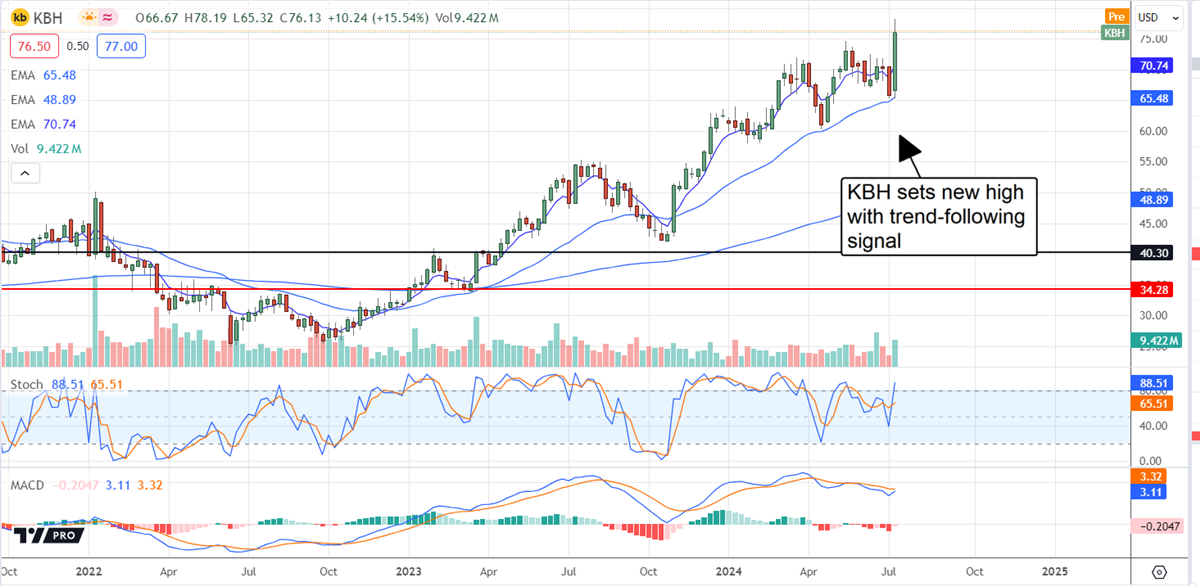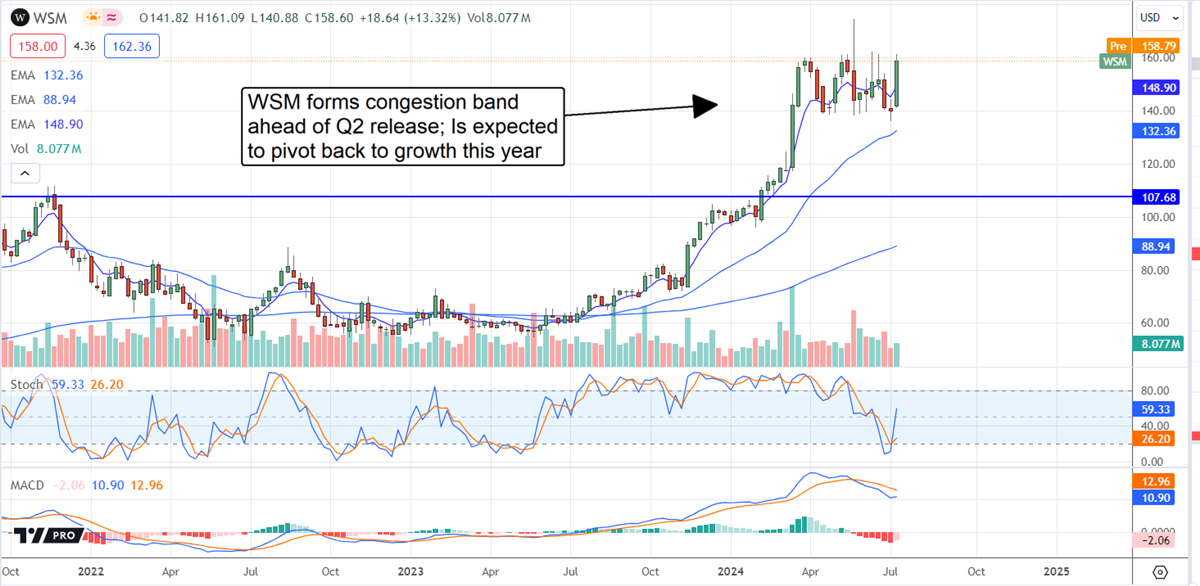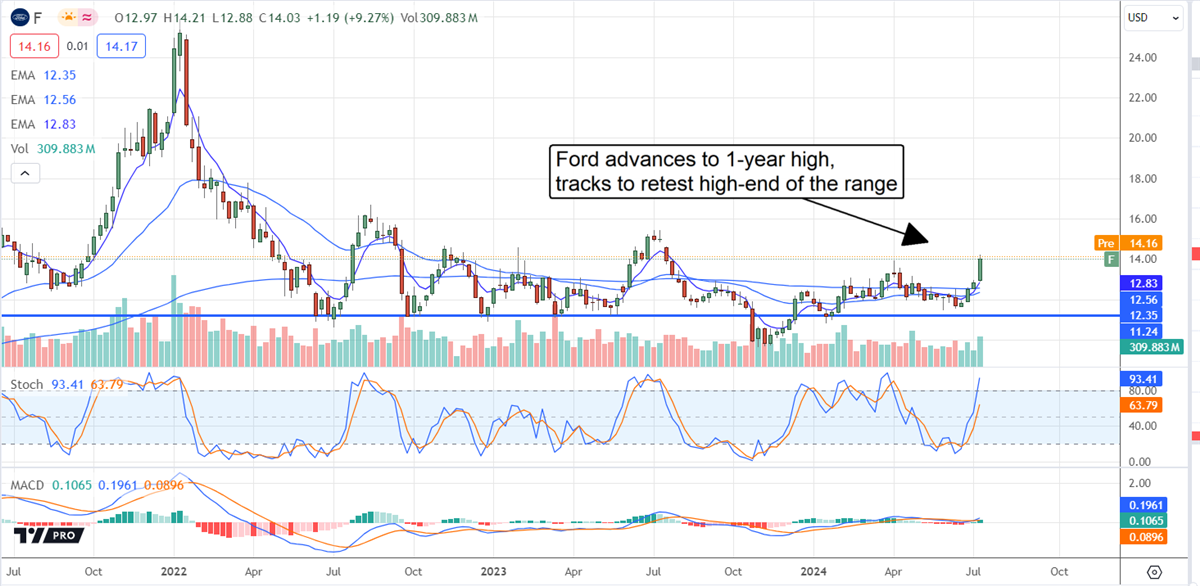
The June CPI was much better than expected and has the broad market set up to rally over the next six to 12 months. The rally is driven by the expectation for FOMC interest rate cuts, which will reduce the cost of money and reinvigorate the bull market, assuming no recession unfolds. While most stocks should see the benefit of lower rates, specific sectors, industries, and stocks are in better positions. Among them are small and mid-caps, viewed as more agile and able to make quicker shifts, consumer-oriented names, and anything with exposure to credit conditions.
Home Builders Business Will Only Get Better
The housing market is among the most impacted by high rates. High rates and rising costs have home buyers on the sidelines despite the historically high demand. The situation has the home builders in the catbird seat because people who want or need to move have virtually no choice but to seek new construction. That dynamic has home builders in a growth phase that lower rates will accelerate. Lower rates will reduce the cost of borrowing, lower monthly payments for new homeowners, and widen the market for builders and buyers. The takeaway is that homebuilders generate robust cash flow, improve their balance sheets (which are in historically strong positions), and build leverage for their investors, including capital returns, dividends, and share repurchases.
The CPI data itself was enough to catalyze these stocks. Names like KB Home (NYSE: KBH), D.R. Horton (NYSE: DHI), and Lennar (NYSE: LEN) gained an average of 13.5% on the news, with KB Home setting a new high. KB Home is the U.S. 6th largest home builder and rated a consensus of Hold by thirteen analysts. The analysts are in an upgrade cycle, issuing eleven price target revisions this year, ten of them higher. The stock is outpacing the increase in the consensus, but its price is being led to the high end of the analysts' range. The next catalyst for this market will be the FQ3 results scheduled for mid-September. Analysts forecast a return to sequential and YoY growth with a solid margin.

Home Improvement Stocks Will Shine, Too
A home building and sales boost will reinvigorate the home improvement market. Not only will new homeowners and builders need to buy supplies and decor, but the homeowners who choose to stay put will also have easier access to those same supplies, fueling a remodeling cycle to go with the housing boom. This has names from Home Depot (NYSE: HD) and Lowe’s Companies (NYSE: LOW) to Sherwin-Williams (NYSE: SHW) and Williams-Sonoma (NYSE: WSM) moving higher. Stocks on this list advanced 7.5% to 13.5% on the CPI news, led by Williams-Sonoma.
Williams-Sonoma is a high-quality retailer with several advantages. Its clientele is more affluent and less impacted by higher rates, so it is better positioned to spend more on its homes when the economic shift begins. It is also among the best-run companies on Wall Street. CEO Laura Alber has focused on profitable growth, quality margin, and shareholder value, resulting in significant cash flow, FCF, capital return, and shareholder value increases. Highlights from the latest report include a historically high margin, a 4x cash build, a 2% reduction in average share count, 0.05x leverage, and a 50% increase in shareholder equity.

Lower Rates Will Unstick the Car Market
Auto sales have been sluggish since 2020 but are on track to boom once interest rates are lowered. Stocks like Ford Motor Company (NYSE: F), gaining share from its most significant rival, General Motors (NYSE: GM), are in a good position to benefit. Its business is growing today and is expected to accelerate over the next few quarters. However, the forecasts for next year are light and do not factor in lower rates, setting the market up for an upgrade cycle. As it is, the forecast for 2025 is for revenue to grow a little faster than 1%.
Shares of Ford advanced 10% on the CPI news and set a one-year high. The market is in rally mode, tracking to break out of a range and set up for a sustained uptrend that could increase the share price by 50% or more. Assuming the company can grow earnings over the next year, the low 7x P/E ratio suggests a deep value today (relative to historical averages) and a chance for earnings-driven share price appreciation and a price-multiple expansion over the next twelve months.
